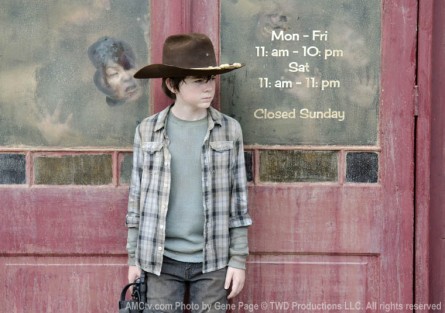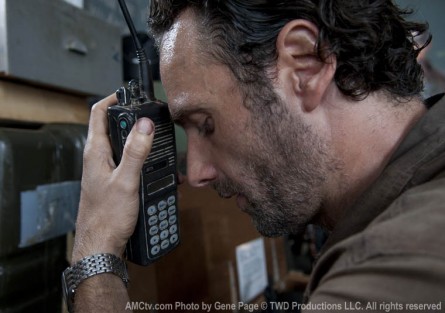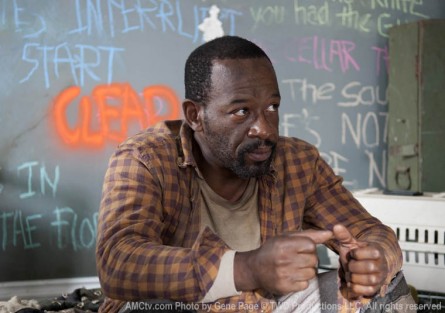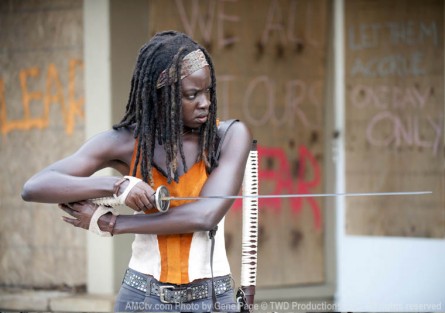
What an amazing and intimate episode. And without all the shooting, zombie wars, and civil wars, we get a glimpse of how much the world and our protagonists have changed since the outbreak.
In many ways, “Clear” serves as a reset, symbolized by our small party’s return to Rick’s town: our characters get a reset since they’ve become stark shadows of their former selves, viewers get a reset with the realization of the changing world in The Walking Dead, the tribe gets a reset with a massive weapons cache, Michonne gets a reset as a member of the tribe, Rick gets a reset as he comes to terms with his mental breakdown, and Carl’s relationship with his father gets a reset.
“Clear,” as much as it was like a warm blanket, also shocked us with what appeared to be cold and inhumane actions. The first shock came with Michonne, Rick, and Carl driving past a survivor on his own screaming after their car for help. The interesting thing here was Carl’s observation of the act, or inaction, from the backseat. He’s clearly learning the ways of the new world through observation: trust no one, stay the course with the mission, and keep in mind the tribe’s greater good.
And they didn’t ditch this guy just once, but twice, which had its consequence (a second theme in this episode) at the end of the episode. Not to mention that it contradicts the lesson Rick teaches Carl when he explained the reasons for Michonne being on this run: “we have common problems, common interests, maybe we can work on them together.” You’d think this concept could be extended not only to this lonely guy on the road, but also to Woodbury, if Woodbury were receptive to it, which it is not.
Now, compare Rick’s indifference to this stranger on the road to Daryl’s selfless act to help the Mexican family on the bridge in the “Home” episode. We might speculate that the writers are trying to tell us that these men are moving in opposite directions.
It’s understandable, however, for at least three reasons that they wouldn’t pick up a sole survivor on the road. First of all, it could be a trap with a greater force laying in wait. Second, we don’t know this guy’s mental stability. Third, the tribe is preparing for war and time is essential – although Rick, Michonne, and Carl took their sweet-ass time in town.
As interesting as it is in psychological terms that Rick went back to his hometown to find weapons, how fricken close is the prison to the town? You’d think that after nine months of being on the road they would have ventured farther away. And if they are farther away, gas seems to be plentiful. The Walking Dead seems to have trouble with conveying travel, given this week’s run and last week’s multiple crossings of the red zone. A lot of these excursions seem as difficult as running down the street to meet the ice-cream truck.
Going back home and expecting his police station’s arms room to still be fully stocked was a little naive, but it did lead to one of the more interesting events of the episode. We got to see Morgan, from Season 1, again. The welcome was less hospitable than the first, but despite Morgan’s insanity and being shot, things were left peaceably.
Morgan’s descent into insanity is owed to his witnessing the his son’s death at the hands, or mouth, of his wife. And there’s a definite contrast here between Carl and Morgan’s son, where new-world weary Carl was able to shoot his mother before she turned, still human actually, and Morgan’s sheltered son couldn’t mercy kill his decomposed mother.
The consequence of Morgan’s inability to execute his wife in Season 1 was his son’s death, and Morgan knows it. In addition to that tragedy, Morgan has surely survived groups of ill-meaning men and swarms of zombies, but he’s somehow managed to build a small arsenal (lucky for our small party) and booby trap the whole town.
Although Carl’s altruistic act, with Michonne in tow, to attain the last remaining picture of his dead mother for his sister showed that humanity still exists in him, we have to wonder how much of it is left. He did, after all, shoot Morgan and basically was unfazed by killing a man – not a zombie, a man. Again, his young impressionable mind is absorbing the world and the actions of those around him.
But, yes, our tribe is comprised of people who were once good, and they still believe they are good people with good intentions. By comparison they are good people, but they still do unspeakable things, like leaving a man to fend for himself and then picking up his backpack when he’s found dead. And while their individual deeds may not always be selfish, they are usually for the best interest of the tribe – screw the rest.
At least Michonne got into the tribe, or “I think she might be one of us” as Carl put it – if Carl is making these sorts of decisions now. It was, however, very interesting to see another dimension to Michonne; in addition to being a ninja killing machine, she has a sense of humor, wryly stating that “the mat said ‘welcome'” when Rick confronts her about eating Morgan’s food. And we learned that she’s not a lesbian; she had a boyfriend and, as she confessed to Rick, she used to talk to him posthumously just as Rick still sees Lori. So, she really does have common problems with Rick, and she’s able to get him to open up about it, even if only with the humorous “good, I see things” reply when Michonne accepts to drive back to the prison.
In a world that’s been reset, people have to act without conscience. Let’s just hope they can live with the consequences. Ghosts, conscience, and consequences – is this turning into a Shakespearean tragedy?
Rock Hard \m/













